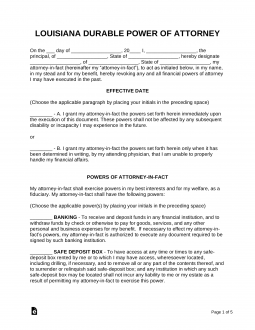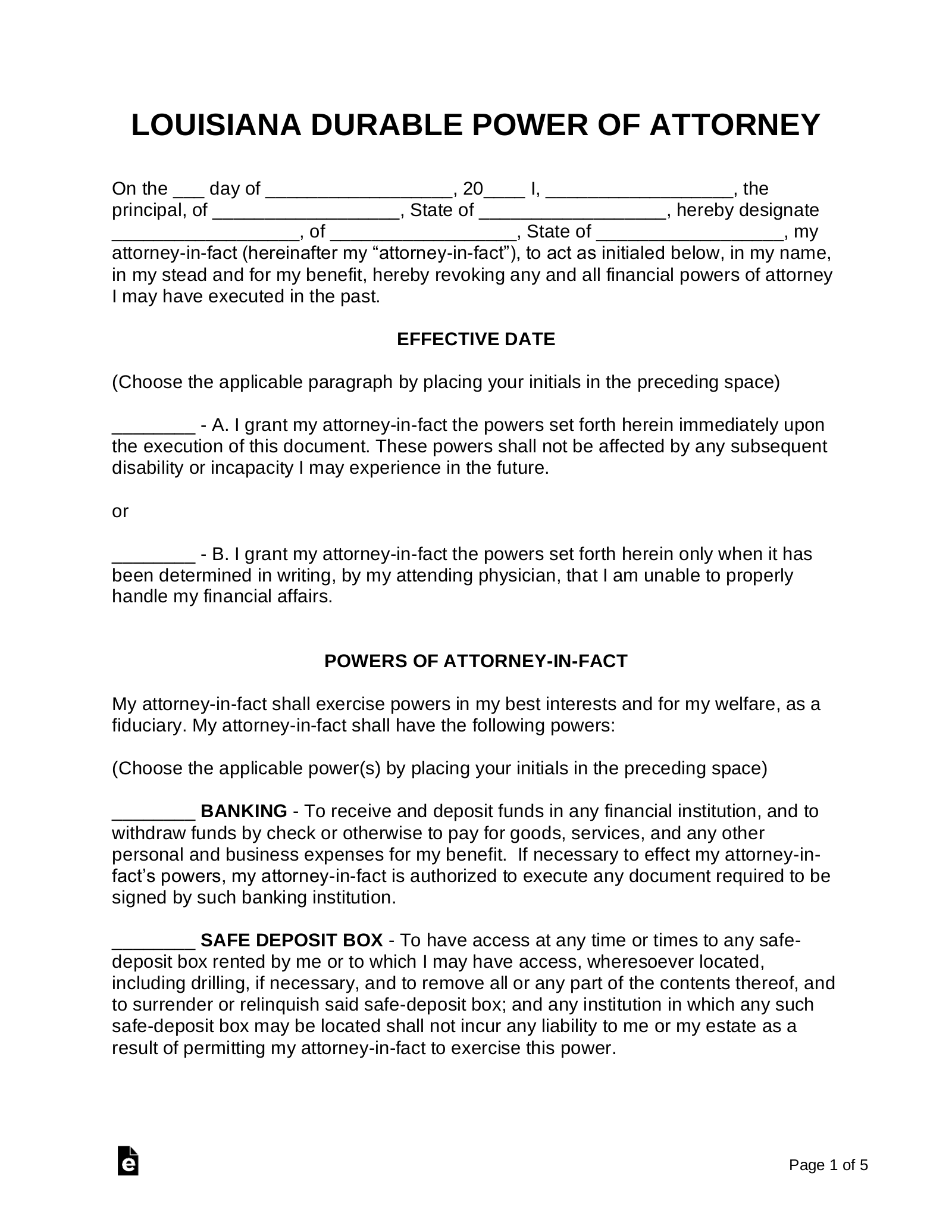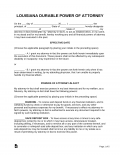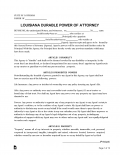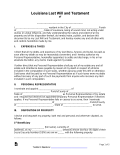Updated August 11, 2023
A Louisiana durable power of attorney form enables a person (“principal”) to appoint a representative (“agent”) to act on your behalf by representing their best interests in financial-related matters. This form is considered “durable” which means that if the principal of the document should become incapacitated or unable to make decisions for themselves, the form will remain in effect. It should be suggested that the agent that is selected, due to their unrestricted power, should be someone that is trusted such as a spouse or close family member.
Table of Contents |
Versions (2)
Download: PDF, MS Word, OpenDocument
Download: PDF
Laws
Louisiana law does not use the term “power of attorney.” Instead, it uses the terms “representation,” “procuration” and “mandate.” The distinction can get complicated, but “procuration” and “mandate” are closest. A “procuration” involves one person gives another person power to perform particular acts involving “legal relations,” but creates no duties that the other person is bound to perform. A “mandate” is closer to a contract, in which both sides agree that one person will act on another’s behalf. Because the “legal relations” of a procuration are generally not thought to include medical matters, a common subject of powers of attorney, and the Louisiana State Elder Commission refers to a health care power of attorney as a “mandate,” this entry is focused on mandates. The relevant laws may be found in the Civil Code, Title XV, Chapter Two, which includes all of Civ. Code Ann. Art. 2989 through Civ. Code Ann. Art. 3032.
Definition of “Durable”
In the absence of contrary agreement, neither the contract nor the authority of the mandatary is terminated by the principal’s incapacity, disability, or other condition that makes an express revocation of the mandate impossible or impractical (Civ. Code art 3024).
Definition of “Power of Attorney”
A mandate is a contract by which a person, the principal, confers authority on another person, the mandatary, to transact one or more affairs for the principal (Civ. Code art. 2989).
Signing Requirements
As noted above, for a mandate to be effective, both the “principal” and the equivalent of the attorney-in-fact must sign the document. Louisiana law does not stipulate witness or notary requirements, but it is recommended to sign in front of at least two adult witnesses and a notary.
Statutory Form
The Louisiana Legislature has not provided a sample statutory form.
How to Write
Download: PDF, MS Word, OpenDocument
Louisiana Declaration
(1) Document Date.
(2) Louisiana Principal. Identify the Lousiana Principal with the name, residential county, and state from the address of the Private Party who wishes to give an Attorney-in-Fact the same power or authority he or she holds in the State of Louisiana.

(3) Determined Attorney-in-Fact. Formally designate the Attorney-in-Fact who will use the principal powers in this document to carry out the Principal’s directives. This designation requires the Attorney-in-Fact’s name, county, and state of residence.
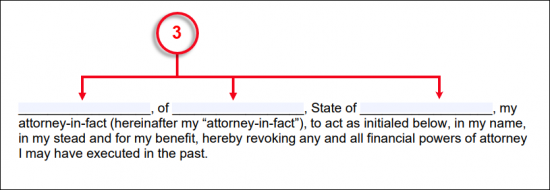
Effective Date
(4) Event Of Effect. A choice is provided regarding when the principal powers will become accessible to the Attorney-in-Fact. To do so, the Principal must initial a statement to approve the authority in this document to become effective (immediately upon signing it) or initial a statement declaring that principal authority will only be granted to the Attorney-in-Fact if (or when) the Principal is medically incapacitated (and diagnosed in writing as such).
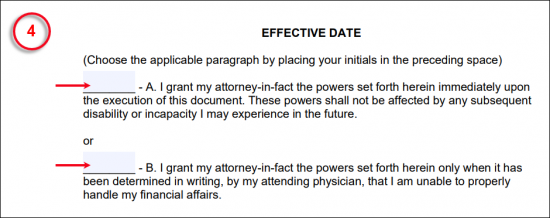
Louisiana Powers Of Attorney-in-Fact
(5) Banking. Deliberate approval from the Principal must be demonstrated so the Attorney-in-Fact can wield the same authority controlled by the Louisiana Principal. This approval should be displayed through the Principal action of initialing the power(s) that will be granted from a list of subjects. One or more powers of attorney can be delivered by initialing the appropriate topics from this list. The Principal should refrain from initialing all powers since a method to grant his or her authority in all areas listed will be presented. For instance if the Principal intends to grant the Attorney-in-Fact authority to handle actions such as deposits, withdrawals, and opening/closing/transferring funds of the Principal’s bank or financial accounts, then he or she (the approving Principal) must initial the first item.
(6) Safe Deposit Box. The authority to access and manage the Principal’s safe deposit boxes can be attached to the Attorney-in-Fact’s principal powers only through the Principal’s act of approving by initial.
(7) Lending Or Borrowing. The Attorney-in-Fact’s ability to engage in making and satisfying loans (i.e. mortgages, liens, etc.) on behalf of the Principal must be authorized to be included in his or her scope of principal authority. Only the Principal issuing this document can deliver such authorization by initialing the third list item.
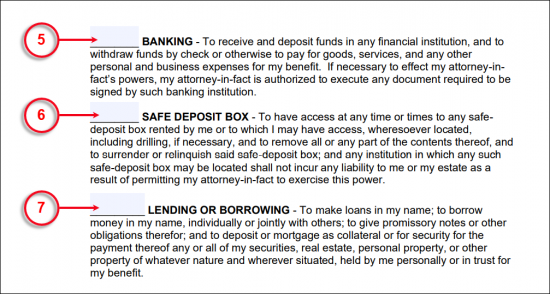
(8) Government Benefits. The Principal can designate the Attorney-in-Fact to manage his or her government benefits paperwork such as applications or appeals and receive benefits in the Principal’s name. This requires the Louisiana Principal’s initials.
(9) Retirement Plan. The option to appoint his or her Attorney-in-Fact with retirement plan powers is available to the Principal. This allows the Attorney-in-Fact to make decisions and take action regarding the Principal’s IRA and other retirement plans through the Principal’s approving initials.
(10) Taxes. Should the Attorney-in-Fact be expected to handle actions such as completing, signing, and paying the Principal’s taxes on that Principal’s behalf then this item will have to be sought from the list then approved by initials the Principal provides.

(11) Insurance. The Principal’s insurance requirements, preferences, and directives regarding his or her insurance (i.e. life, health, automobile…”) can be placed in the Attorney-in-Fact’s scope of principal powers once initialed by the issuing Principal.
(12) Real Estate. The Principal must initial the appropriate item to give the Attorney-in-Fact the same authority he or she carries with real estate. For instance, the Principal can direct the Attorney-in-Fact to perform actions such as selling or conveying real property on the Principal’s behalf with this approval.
(13) Personal Property. The Principal’s personal property matters can be taken care of by the Attorney-in-Fact so long as the Principal grants him or her the authority to carry out directives by supplying his or her initials of approval.
(14) Power To Manage Property. If the Principal seeks to depend upon the Attorney-in-Fact to wield principal authority to carry out property management tasks such as maintenance, investing, insuring, renting, leasing, etc on his or her behalf then the Agent’s authority must be approved with the Principal’s initials next to the appropriate list item.
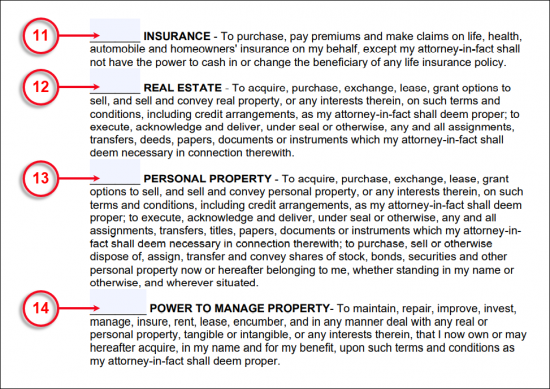
(15) Gifts. The Principal’s power to accept, make, transfer, forgive, and negotiate gifts can be assigned to the Attorney-in-Fact through the Principal’s official initials of approval. Be advised, this applies to tangible and intangible property.

(16) Legal Advice And Proceedings. The ability to seek legal counsel, pay for it, and initiate court action or arrange defense can be granted to the Attorney-in-Fact by initialing the final list item.

(17) Special Instructions. Any preference, provision, restrictions, or instructions to the Attorney-in-Fact that the Principal wishes to include with the grant of authority that will be delivered should be documented within the contents of this declaration. While several lines are available for Principal use, an attachment can be made with this information if more room is needed. Be advised that such an attachment should be dated, titled, and named in this form as well as physically included by the time the Principal’s signing occurs.

State Law
(18) Jurisdiction. Verify the state whose courts will enforce this document and protect the Principal’s rights.

Witnessed Principal Signature
(19) Signature Date. The exact calendar date that the Principal signs this paperwork must be on display with his or her signature.
(20) Signature Of Principal. The Principal must perform the task of signing this document to effect before two Lousiana Witnesses and Notary Public.

Witness Testimony
(21) First Witness Signature. The First Witness must sign his or her name then record his or her address as confirmation that the declaration statement presented with this signature area is true.
(22) Second Witness Signature. The Second Witness area requires the next Witness’s signature and address as verification of the Witness statement’s accuracy.
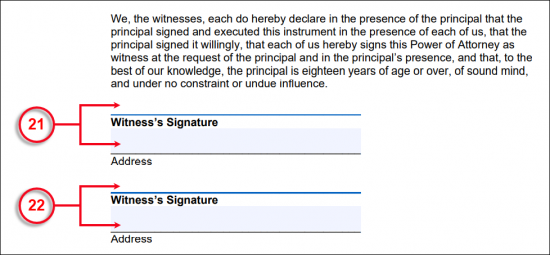
(23) Louisiana Notarization. The Notary Public who has watched the Principal’s signing along with the two Signature Witnesses will subject this document to the notarization process to authenticate these signatures.
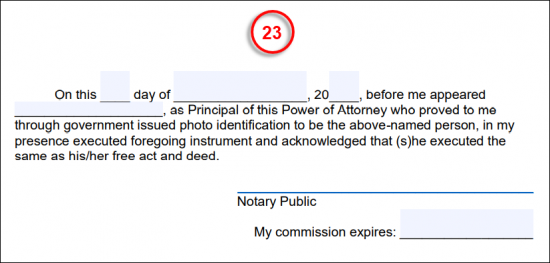
Specimen Signature And Acceptance Of Appointment
(24) Attorney-in-Fact. Use the full name of the Attorney-in-Fact to supplement the Specimen Signature and Acceptance of Appointment statement.
(25) Attorney-in-Fact’s Notarized Signature. The Attorney-in-Fact must sign his or her name before a Notary Public.
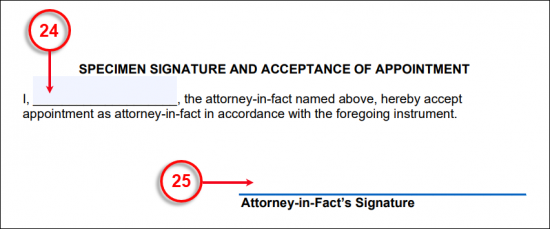
(26) Notarization. The Notary Public attending the Attorney-in-Fact signing will notarize this action to finalize it.
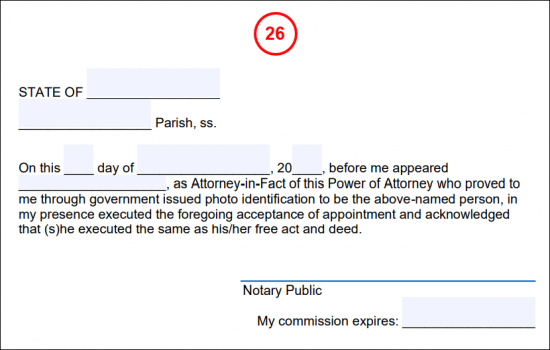
Related Forms
Download: PDF
Download: PDF, MS Word, OpenDocument

